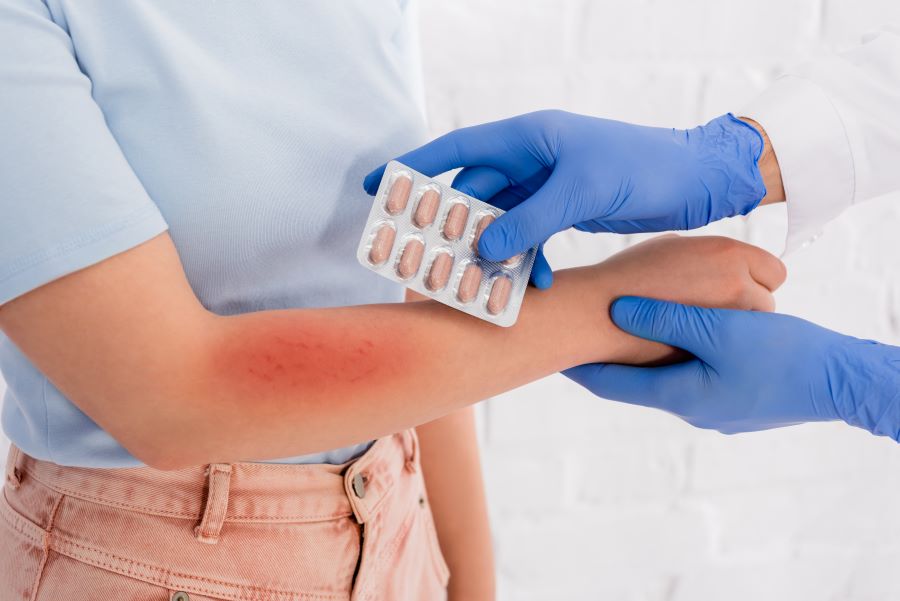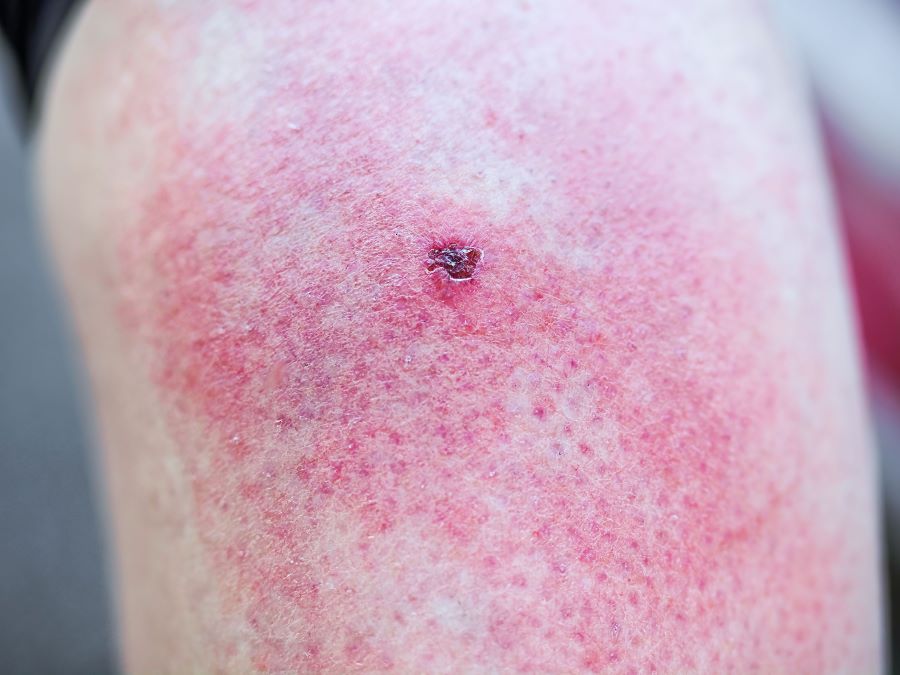What is the Treatment for Scorpion Bite (Sting)?

Around 1.5 million people worldwide are stung by a scorpion every year. Most of the scorpion stings are not dangerous. However, certain stings can be life-threatening. Therefore, if you ever encounter a scorpion sting, diagnosing and treating it correctly becomes imperative.
Understanding the severity and identifying the symptoms is a must when you encounter such a situation. Continue reading this article to know the complications and how to treat a scorpion sting.

Table of Contents

What are Scorpion Stings?
Scorpions belong to the class of arachnids and live in dry and warm climates around the world. The segmented tail, which the scorpions have holds a stinger along with two glands that contain venom. Scorpions poke the stinger in a person or animal when they feel threatened or attacked and inject venom. This is known as a scorpion sting.
Depending on the venom and scorpion, it is a defense mechanism that can cause great damage and pain. Understanding these stings is very important to prevent them and find effective treatment.
What Happens After a Scorpion Bite?
Most of the scorpion sting symptoms subside without any treatment for 48 hours. Nevertheless, a few severe symptoms continue to appear for 24 hours. Some people might go through mild symptoms such as swelling, numbness, or tingling in the area of the sting.
However, a bark scorpion sting can have more severe symptoms. such symptoms include breathing difficulties, muscle thrashing, sweating, nausea, and high blood pressure.
Type of Scorpion Venom

Venom possesses many different effects on organisms. The types of venom can elicit a range of signs, from mild localised pain to harsh and potentially vicious systemic responses.
What are the Possible Complications of a Scorpion Sting?
Very young and very old individuals are at a higher risk of dying when the scorpion sting is left untreated. The heart of the respiratory system fails to work after a sting for such people.
Though rare, another complication due to a scorpion sting is a serious allergic reaction known as anaphylaxis.
Moreover, scorpion sting complications may be sustained in immune-compromised subjects or other subjects with a history of ill health. In this case, severe systemic reactions can go as far as multi-organ failure and septic shock. Other complications of scorpion stings could be infection of the area surrounding the sting, especially in the absence of proper treatment for the wound.
Furthermore, scorpion stings could also aggravate the weakening of cardiac functions in some people with heart ailments. Such measures are valuable in averting the early management of these most serious injuries and containing the venom's effects.
What Causes Scorpion Stings?
The stinger in the tail of a scorpion causes scorpion stings. During a scorpion sting, the stinger might release venom. This is a cocktail of neurotoxins, enzymes, and peptides that work on different pathways and cellular processes within the body that affect the nervous system.
This venom contains toxins that affect a person's nervous system. The intensity of the response depends on the scorpion, the dose of venom, and the particular person’s reaction to the sting. However, scorpions do not sting unless someone provokes or attacks them.
What are the Symptoms of Scorpion Bite?

It is important to see the signs of scorpion stings to find treatment, cure, and management. The symptoms of a scorpion sting are as follows:
Furthermore, the signs and symptoms of widespread venom effect are as follows:
How to Diagnose a Scorpion Sting?
The doctors need to know the symptoms and history of a person stung to diagnose the issue. In case of severe symptoms, the doctor might recommend that you do blood or image testing to make sure of the effects of venom on the liver, lungs, heart, and other body organs.
Besides understanding symptoms and history, one must admit that a physical examination is also important. This encompasses monitoring the temperature, pulse, and blood pressure to evaluate systemic responses. The physician may also check the affected area for any delocalized responses and other effects.
When severe symptoms such as oral motor or respiratory appear, more advanced approaches may be required to determine how extensive the toxicity damage is to the nervous and, possibly, respiratory systems. Correctly identifying the problem and timely providing treatment is crucial for effectively managing scorpions' poisonous effects.
How are Scorpion Bites Treated?

Most cases of scorpion stings do not require any medical treatment. However, in case of severe symptoms, you might need medical care. Medical professionals may give you drugs intravenously to treat the pain.
Children or adults with serious symptoms might get anti-venom to treat a scorpion sting.
Furthermore, certain home remedies can treat a scorpion sting. These methods include:
- The wound should be cleaned with water and mild soap.
- Applying a cool compress in the affected region might reduce the pain.
- If needed, take an OTC pain reliever or ibuprofen.
- If possible, elevate the swollen injured arm. This helps reduce edema due to greater blood circulation and better fluid clearance.
- Do not rub and/or scratch the site of the sting. This prevents additional aggravation of the skin and possible introduction of the bacteria.
- Keep wounds and sting areas clean and watch for infections. If the condition worsens or does not improve after a while, go to a doctor as soon as possible.
- Drink more fluids. Proper water intake and other fluids aid the speed of recovery and the body’s ability to cope more effectively with the adverse effects of the sting.
How Can Scorpion Stings Be Prevented?
Scorpions are nocturnal creatures, but they can sting at any time. You can prevent a scorpion sting by wearing long pants, sleeves, and gloves when you are in an area where scorpions nest. In such places, ensure to shake your clothing and shoes before wearing them.
Living, hiking, camping or working where the scorpions reside increases the risk of getting a scorpion sting. In such areas, make sure to check the surroundings beforehand to avoid a sting. In case you see a scorpion, use a tong to drive it away from yourself or other people.
In conclusion, make sure you and other people around you learn how to identify the signs of a scorpion sting on a patient and how to perform first aid depending on the symptoms. Assuming all the risks and precautions, it is possible to significantly decrease the risk of scorpion stings and make everybody’s life safer by preventing them altogether. Awareness is the biggest way to avoid the dangers of these creatures.
Protect What Matters - Explore Other Insurance Options













